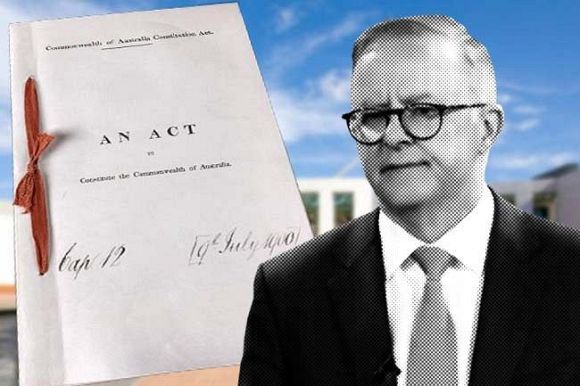Australia’s flag remains a colonial relic. Changing it could be the first step toward long-overdue constitutional reform and true independence, writes Dr Klaas Woldring.
CREATING A NEW FLAG may very well be the first step to re-commence constitutional renewal, something the Albanese Government has sadly been avoiding altogether. The almost complete lack of attention to progress towards a republic may be due to many other political priorities. However, reflecting on the importance of system governance progress even before the next federal election would seem too timely now.
The Australian flag is not mentioned in the Australian Constitution. Developing a new flag is entirely up to the people and, of course, the Federal Parliament. The existing flag’s origin is based on Australia’s prior colonial relationship with the British Crown. For several reasons, it makes perfect sense that the renewed process of constitutional change starts with changing the Australian flag.
The existing flag is described in the 1953 Flags Act Section 3. That flag and other new flags for the states and territories are dictated by the voting of electors. The Albanese Government could address this situation by showing awareness of the issue should it be re-elected.
The deafening silence about the need for constitutional change reveals the ALP’s system conservatism. This was also recently revealed by the passing of the Electoral Legislation Amendment (Electoral Reform) Bill 2024, which aims to strengthen the major parties in future federal elections. That report is expected to be coloured by the views of Senator Don Farrell, who indicated that he would endeavour to reinforce the position of the major parties and the two-party system.
This questionable approach would not assist in bolstering Australia’s democracy at all.
However, the attitude of ALP Leader Anthony Albanese has been to not rock the boat as much as possible. The result of this has made Labor less distinguishable from the Opposition, likely in the hopes of drawing wider support in the next election. Not only has the environment been the loser here, but constitutional and system change has simply not been attempted at all.
Australia can only hope that this stance will change if the ALP narrowly wins the election. There are progressive ALP ministers who could and really should take over leadership. However, for the moment, the political system in Australia is caught in a vicious cycle. Electoral reforms that would strengthen the two-party system and damage smaller parties and Independents in any way would be an error.
In contrast, system renewal would be welcomed widely. Major electoral reform is needed to achieve that. We really do need some bravery from the ALP, which would only increase its chances for re-election.
What is being contemplated here is not unlike other Anglo systems in this respect. The UK and U.S. face major problems largely due to their electoral systems, all based on single-member district electoral systems. The outcome of the recent national elections in both countries demonstrates this quite convincingly.
The Labour Party’s victory in Britain very much suggests that the proportional system has suddenly gained widespread support. Strong campaigns have been mounted in recent years by mostly Labour Party sympathisers, but now that a Labour government has been elected, conservatives have come on board as well. The reason for that is that the huge Labour majority gained in the House of Commons does not reflect the total votes for that party.
As one observer commented:
‘The UK’s 2024 general election was the least proportional of modern times. Labour’s substantial parliamentary majority rested on the smallest ever winning party vote share. The Conservatives, meanwhile, suffered one of their worst ever results.’
In the U.S., the two-party system is also the result of single-member districts used in almost all states, resulting in a two-party system overall. In almost all states, as is also the case in Britain, the simplistic “first past the post” rule governs these districts, a further anti-democratic feature.
The U.S. has now managed to come up with a president and many Americans are wondering how this could have happened. As the four-year term proceeds, questions about that electoral system are likely to be discussed more seriously than in the past.
However, the enormous difficulties to amend Australia’s colonial Constitution are not an issue when it comes to changing the flag. A way to overcome these difficulties resulted in the Australia Act 1986, granting Australia legal independence from the United Kingdom by removing the power of the UK Parliament to legislate for Australia and its states and territories.
A similar act was passed by the UK Government at the same time. No mention of the flag then, either. The act was meant to ensure Australia’s independence from the UK, something that was apparently practically impossible in other ways.
It seems to me that the creation of a new flag that represents the existing multi-cultural population, as well as the Indigenous people, would be welcomed by most Australians. It is also something that the Government can even plan for right now and thereby show its awareness that the policies of constitutional change are indeed still very much part of its policy program.
When the Australian people again have the opportunity to prepare for a vote on a flag constitutional change, it is likely to follow much more readily than in the past. Such a flag needs to say that by its design and colours.
Such a flag needs to represent Australia and its desirable future fully and not be encumbered with prior colonial ties. The ALP would be wise to at least prepare for such a campaign should it be re-elected, if not earlier. This, in itself, would also resume discussions of a new republican Constitution.
Dr Klaas Woldring is a former associate professor at Southern Cross University and former convenor of ABC Friends (Central Coast).
Support independent journalism Subscribe to IA.
Related Articles













